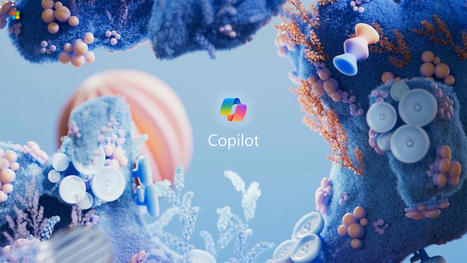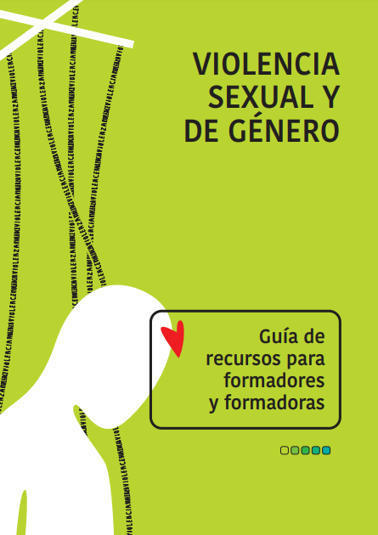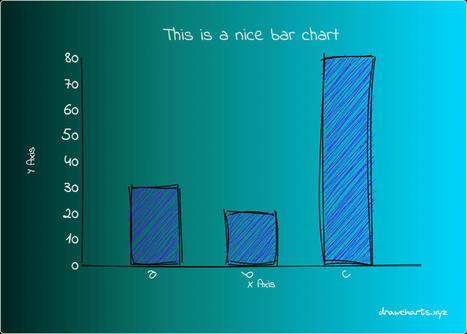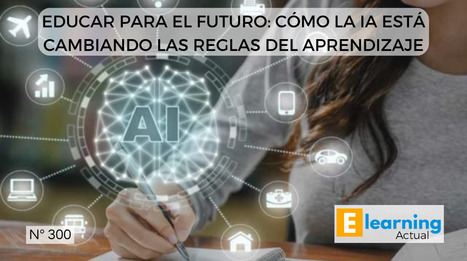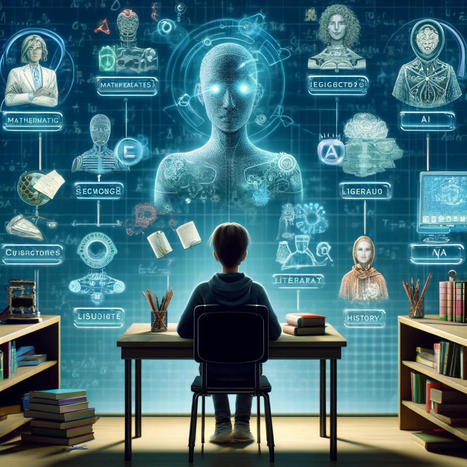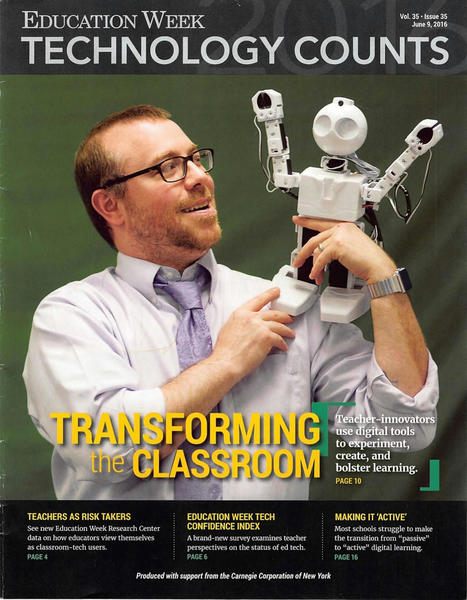 Your new post is loading...
 Your new post is loading...
Cada vez más gente hace teletrabajo, y por eso es importante contar con las mejores herramientas para poder agilizar tus reuniones online. En el vídeo de hoy te hablo de una de ellas: ONLYOFFICE DocSpace, que ahora puedes integrar directamente con Zoom, la popular utilidad de videollamada. Con la integración de ONLYOFFICE DocSpace en Zoom…
Via Ramon Aragon
There is a war going on. Humanity and nature are on one side and Big Tech is on the other. The two sides are not opposed. They are orthogonal. The human side is horizontal and the Big Tech side is vertical.*
The human side is personal, social, self-governed, heterarchical, open, and grounded in the physical world. Its model is nature, and the cooperative contexts in which competition, creation, and destruction happen in the natural world.
The Big Tech side is corporate, industrial, hierarchical, competitive, mechanistic, extractive, and closed, even though it produces many positive-sum products and services that are good for people and good for nature. It is also, being competitive and rewarding toward winner-take-most outcomes, dominated by giants.
Via Edumorfosis
A recent study shows that almost half (49%) of college students are using general purpose GenAI writing tools such as ChatGPT.
However, despite students increasingly turning to these GenAI tools, they remain apprehensive when it comes to using them for learning. A recent global student survey shows that only 4% of U.S. students said they turn to GenAI first when stuck on a concept or assignment.
Via Edumorfosis
"TOPEKA, Kan.(AP) — Kansas could soon offer up to $5 million in grants for schools to outfit surveillance cameras with artificial intelligence systems that can…."
Via Leona Ungerer
ACODE’s mission is to enhance policy and practice in Australasian higher education around technology enhanced learning and teaching at institutional, national and international levels through:
-Disseminating and sharing knowledge and expertise.
-Supporting professional development and providing networking opportunities.
-Investigating, developing and evaluating new approaches.
-Advising and influencing key bodies in higher education.
-Promoting best practice.
Via Peter Mellow, juandoming
Turnitin referenced a study conducted in Spring 2023 it contributed to with Tyton Partners, showing academic cheating as the number one concern of educators, as high numbers of students revealed they were "likely or extremely likely to use generative AI writing tools, even if they were prohibited."
The study also showed that 97% of academic institutions were woefully unprepared to deal with the issue — only 3% had developed a policy about it.
Via Edumorfosis
There is one shift that will radically improve asynchronous discussions: a structured conversation system (Coker, 2022). A structured conversation system (SCS) is as easy as 1-2-3.
Via Vladimir Kukharenko
It’s also somewhat eclipsed conversations about the ethics of how these tools are implemented, according to one observer. Nevertheless, teachers are already deciding how — or even whether — to adopt these tools into the classroom. And the decisions those teachers make may be influenced by factors like how familiar they are with the technology or even what gender they are, according to a new study.
Via Edumorfosis
"This article is based on a series of short LinkedIn posts and includes the original ideas, plus some of the feedback and discussion from the comments. Head over to my profile on LinkedIn to find the originals. In recent weeks, I've shared my thoughts on Generative AI (GenAI) and its impact on assessments, particularly the…"
Via Leona Ungerer
Explore how Artificial Intelligence is revolutionizing eLearning, by enhancing personalized learning and optimizing content delivery.
Via Vladimir Kukharenko
Por un lado, encontramos una corriente que idealiza y sobredimensiona el potencial de la tecnología, considerándola como la solución mágica que resolverá todos los desafíos y problemas que enfrenta la educación en la actualidad. Pero, por otro lado, también existen voces que rechazan completamente la incorporación de la tecnología en los procesos de enseñanza y de aprendizaje, argumentando que socava los métodos tradicionales y el rol fundamental del docente.
¿Es posible encontrar un equilibrio entre estas visiones extremas? ¿Cómo podemos aprovechar el potencial transformador de la tecnología sin caer en su idealización o demonización? ¿Qué enfoque debemos adoptar para integrar la tecnología de manera efectiva y complementaria en la educación?
Via Edumorfosis
Recently, we announced several expansions for education audiences. Microsoft Copilot with commercial data protection is available to all faculty and higher education students ages 18 and above. And, Copilot for Microsoft 365 eligibility will now include education faculty and staff.
Our efforts are guided by our Responsible AI principles and standard and build on decades of research on grounding and privacy-preserving machine learning. Additionally, our Customer Copyright Commitment means education customers can be confident using our services and the output they generate without worrying about copyright claims. We look forward to exploring the potential for these offers in education, iterating and improving, and supporting all education organizations in the era of AI.
Via Edumorfosis
La IA ha demostrado ser excepcionalmente competente en la imitación de estilos de escritura y la generación de textos coherentes. Modelos de lenguaje como GPT de OpenAI pueden generar respuestas y contenidos que se alinean estrechamente con las instrucciones proporcionadas, haciéndolas herramientas valiosas en campos como el periodismo, la creación de contenido web y la asistencia académica. Estas capacidades permiten a la IA realizar tareas de redacción voluminosas o repetitivas, liberando a los humanos para enfocarse en aspectos más creativos y analíticos de la escritura.
Via Edumorfosis
|
Guía en el marco del Proyecto MED-RES (MEDiterranean Reception Systems’ coordinated RESponse for People in Migration – PiM – victims o
Via Ramon Aragon
There are at least four very serious scholarly papers that tested these “AI Detectors” and found they are completely ineffective. However, the worst thing about them is not that they don’t work, It is that they are prone to flagging our most vulnerable students as cheaters! In GPT detectors are biased against non-native English writers, by Weixin Liang, Mert Yuksekgonul, Yining Mao, Eric Wu, James Zou and published in Liang, Weixin in the publication arXiv in July 2023, they showed that:
Via Edumorfosis
Generate visually appealing and unique hand-drawn style charts, perfect for presentations, educational materials, and data visualization
Via Nik Peachey
One of the things we try to do on this show is introduce people to various higher education systems around the world … Continued
Via Vladimir Kukharenko, juandoming
La inteligencia artificial (IA) está redefiniendo las estructuras de enseñanza y aprendizaje que conocíamos. Este cambio no se limita a la incorporación de nuevas herramientas tecnológicas en el aula, sino que se extiende a cómo concebimos la educación y su capacidad para adaptarse a las necesidades individuales de cada estudiante.
La promesa de la IA en la Educación es doble: personalización a gran escala y democratización del acceso al conocimiento. El aprendizaje marca el comienzo de una era donde la educación para el futuro se vuelve más inclusiva, adaptativa y eficaz.
Via Edumorfosis
Juan Domingo Farnós Miró La autorregulación en la educación disruptiva se refiere a la capacidad de los estudiantes para regular y controlar sus propios procesos de aprendizaje de manera independiente. En el contexto de la inteligencia artificial (IA) en la transformación universitaria, esto implica el uso de tecnologías de IA para personalizar y adaptar la…
Via juandoming
There is a war going on. Humanity and nature are on one side and Big Tech is on the other. The two sides are not opposed. They are orthogonal. The human side is horizontal and the Big Tech side is …
Via Vladimir Kukharenko
Digital platforms are routinely used in universities to support teaching and learning, but they can also challenge academic freedom and intellectual property (IP) rights. In our new report for Education International, ‘Behind the platforms: Safeguarding intellectual property rights and academic freedom in Higher Education’
, we reviewed the landscape of edtech platforms used in higher education (HE) to facilitate learning and assessment, closely examining their terms of use and privacy policies to make sense of the challenges they pose to academic freedom and intellectual property.
Via Vladimir Kukharenko
No conozco a nadie que afirme que el sistema educativo es maravilloso y que no hay que cambiarlo en nada. Pero sí conozco a demasiados que se niegan por principio a introducir tecnología en él, supongo que por miedo a «desvirtuarlo». ¿Cuáles son esas supuestas «virtudes» que pretenden proteger? ¿No llevamos ya suficiente tiempo comprobando los efectos de prácticamente no cambiar nada, o simplemente introducir tecnología sin cambiar para nada la metodología más que de manera cosmética? ¿No deberíamos cambiar de estrategia y dar la oportunidad a los que creen que se pueden introducir muchos elementos nuevos en la educación para intentar adaptarla al contexto tecnológico y al papel que esa tecnología juega en la sociedad?
Via Edumorfosis
We analyse the effects of AI on student experience, consider AI’s benefits and risks, and identify 11 strategies to support universities.
"I have explored lots of different uses of AI for myself and for my students. I'd like to share a few of the ways I have used two tools to help me in those areas."
Via EDTECH@UTRGV, juandoming
|



 Your new post is loading...
Your new post is loading...















